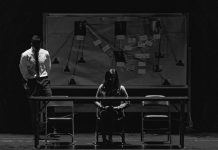Lahore: A number of classical music instruments likeVachiter Veena, Chung and Manjira are disappearing in Pakistan along with their history, traditions, culture, musicians and maestros.
“Some of these instruments carry more than five hundred years of Sub-Continent’s cultural history. The art of playing these instruments was transferred from generation to generation by the maestros,” Pride of Performance award holder, author, teacher and classical singer Ustaad Badar Uz Zaman told News Lens Pakistan.
Manjira instrument consisted of two big plates of brass mostly played in musical bands and Ustaad Khuda Baksh was the last player in Pakistan. Moreover the instrument Ik Tara was invented by Ustaad Sain Marna but now it belongs only to one or two persons in the country,” Zaman added. “Regrettably mouth instrument Chung and string instrument Vichitra Veena is also nowhere to be found in Pakistan since 2000,” he further stated.
Musicians say that playing classical music instruments don’t give enough opportunities to earn money to make both ends meet. Even the film as well as music industry is taking its last breath. Radio Pakistan and PTV were two big sources of earning money but now there is nothing left for the cultural activities.
Ustaad Abdur Rauf told News Lens Pakistan, “The downfall of film industry is a major cause in the decline of these instruments. It was once a huge source of money and attraction for new comers. Instruments like small Dafli, Dholak and Ghara are also under great threat of disappearance. Even instruments like Pakhavaj, Santoor, Sarinda, Sarod, Shahnai, Kartal, Jori (pair of flute), Pungi and Jal Tarang are limited to only one or two players in the whole country.”
He further stated that even instrument players feel guilty as they use keyboard for composing music instead of having an orchestra, teacher, musician and a classical singer.
Jal Tarang is an instrument played on seven to fourteen bowls filled with water. Music comes with the movement of water levels created in the bowls, the only known Jal Tarang player Liaqat Hussain told News Lens Pakistan. Hussain is the only solo Santoor player left after the demise of Ustaad Salamat Ali Khan in 2013.
Santoor originated in Kashmir and it has roots with Persian and Mesopotamian tradition. Hussain says, “I am playing these instruments for the last thirty years but my kids have no association with these as I couldn’t earn any charm, honor or comfort for them”.
Sarod means charming sounds. It belongs to string family and has roots with Afghanistan and Persian traditions, Tanveer Tafu, one of the two Sarod players said. “It’s a difficult instrument to learn and youngsters have no interest in it. Financial charm is also nowhere. I owe only one pupil that means the future of this instrument isn’t bright,” he further added.
Pakhavaj player Ustaad Allah Lok is also disappointed with his financial status. He tells News Lens Pakistan that there are only a few opportunities that come from time to time and he is given only PKR two thousand per performance.
“Pakhavaj is accompanied with classical dance or singing of classical dhrupad style. Tabla is derived from Pakhavaj but both carry different strokes”, he added. “Classical singers have abandoned this instrument and events of classical singing are few now.”
Folk instrument Kartal is left only in remote areas of Sindh and Jori (pair of flute) is limited to traditional festivities in rural Punjab and Sindh. Ustaad Badar Uz Zaman tells News Lens Pakistan that snake charmers usually play Pungi as it has no attraction for others.
Sarinda, on the other hand, belongs to string family and carries Nepali and Sub-Continent traditions. Strings of Saridna vary from three to thirteen. Only Sarhadi family in Peshawar is still associated with this instrument for the last century. “I don’t know any other Sarinda player in the country,” Ejaz Sarhadi told News Lens Pakistan.
Ten music instruments are being taught in Lahore Arts Council but none of these classical instruments are included.
Chairman Lahore Arts Council Atta Ul Haq Qasmi told News Lens Pakistan that youngsters want to learn Guitar, Harmonium and Keyboard in spite of classical instruments. “Youth have no charm in classical instruments because world trends have changed now. In addition, these instruments have slow pace that is another reason of disliking in youngsters”, he added.
Punjab government has put PKR 20 million for monthly stipend to those musicians who are still trying to keep classical instruments alive, Rana Arshad, advisor to Chief Ministers Punjab, told News Lens Pakistan.
“Government understands the problems of technicians and musicians. A plan is also under preparation to help film industry regain its glory which will ultimately help these musicians and others”, he further says.



